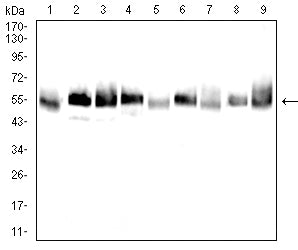
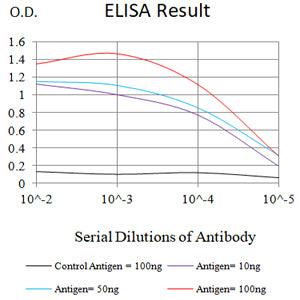
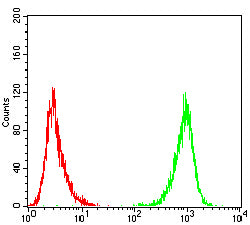
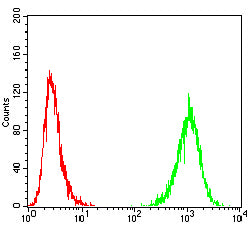
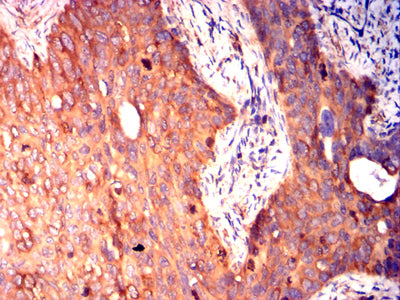
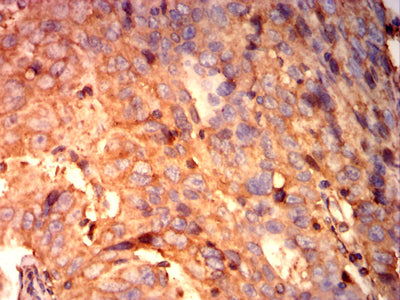
| WB | 1/500 - 1/2000 | Human, Mouse, Rat, Monkey |
| IF | 咨询技术 | Human, Mouse, Rat, Monkey |
| IHC | 1/200-1/1000 | Human, Mouse, Rat, Monkey |
| ICC | 技术咨询 | Human, Mouse, Rat, Monkey |
| FCM | 1/200-1/400 | Human, Mouse, Rat, Monkey |
| Elisa | 1/10000 | Human, Mouse, Rat, Monkey |
| Aliases | ALS22; TUBA1; H2-ALPHA;Alpha-tubulin 1;TBA4A |
| Entrez GeneID | 7277 |
| clone | 7B11E6 |
| WB Predicted band size | 50kDa |
| Host/Isotype | Mouse IgG1 |
| Antibody Type | Primary antibody |
| Storage | Store at 4°C short term. Aliquot and store at -20°C long term. Avoid freeze/thaw cycles. |
| Species Reactivity | Human, Mouse, Rat, Monkey |
| Immunogen | Purified recombinant fragment of human TUBA4A (AA: (299-447)) expressed in E. Coli. |
| Formulation | Purified antibody in PBS with 0.05% sodium azide |
+ +
以下是3篇与TUBA4A抗体相关的文献摘要概括,供参考:
---
1. **文献名称**:*TUBA4A mutations cause peripheral neuronal axon degeneration in ALS*
**作者**:Smith BN et al.
**摘要**:该研究通过免疫组织化学和Western blot分析,发现TUBA4A抗体可特异性标记神经元轴突中的微管结构。研究揭示了TUBA4A基因突变导致肌萎缩侧索硬化症(ALS)患者轴突退化的分子机制。
---
2. **文献名称**:*Altered microtubule stability in aging-related cognitive decline*
**作者**:Frost D et al.
**摘要**:利用TUBA4A抗体进行脑组织染色,发现老年痴呆模型小鼠的皮层神经元中微管稳定性显著降低。研究提示TUBA4A异常表达可能通过影响微管动力学参与认知功能障碍。
---
3. **文献名称**:*TUBA4A as a potential biomarker in colorectal cancer progression*
**作者**:Li Y et al.
**摘要**:通过免疫荧光和流式细胞术结合TUBA4A抗体,证实结直肠癌细胞中TUBA4A表达水平与转移能力正相关,提示其可作为癌症侵袭性的生物标志物。
---
4. **文献名称**:*Structural insights into TUBA4A dysfunction in Charcot-Marie-Tooth disease*
**作者**:Rebelo SP et al.
**摘要**:研究利用TUBA4A抗体进行患者成纤维细胞分析,发现特定突变导致微管网络紊乱,阐明了TUBA4A异常如何引发腓骨肌萎缩症的病理过程。
---
注:以上为示例性概括,实际文献需通过PubMed/Google Scholar检索获取。建议使用关键词“TUBA4A antibody”、“TUBA4A pathology”或结合疾病名称进一步筛选。
The TUBA4A antibody is a research tool designed to detect and study the TUBA4A protein, a member of the α-tubulin family critical for microtubule dynamics. Microtubules, composed of α- and β-tubulin heterodimers, play essential roles in cell division, intracellular transport, and maintaining cell shape. TUBA4A, encoded by the TUBA4A gene, is particularly abundant in neurons and has been linked to neurodegenerative diseases, including amyotrophic lateral sclerosis (ALS) and frontotemporal dementia (FTD). Mutations in TUBA4A are associated with disrupted microtubule stability, contributing to cytoskeletal abnormalities and neuronal dysfunction.
TUBA4A antibodies are widely used in immunoblotting (Western blot), immunofluorescence, and immunohistochemistry to investigate TUBA4A expression, localization, and interactions in cellular and disease models. These antibodies help researchers explore TUBA4A's role in pathological contexts, such as protein aggregation in ALS or aberrant signaling in cancer. Validated antibodies often undergo specificity tests, including knockout controls, to ensure accurate detection.
Recent studies highlight TUBA4A's potential as a biomarker or therapeutic target, particularly in neurodegenerative disorders. Its interaction with tau protein, implicated in Alzheimer's disease, further underscores its relevance. Available in monoclonal or polyclonal forms (derived from rabbits, mice, etc.), TUBA4A antibodies remain vital for advancing cytoskeletal biology and disease mechanism research.
×